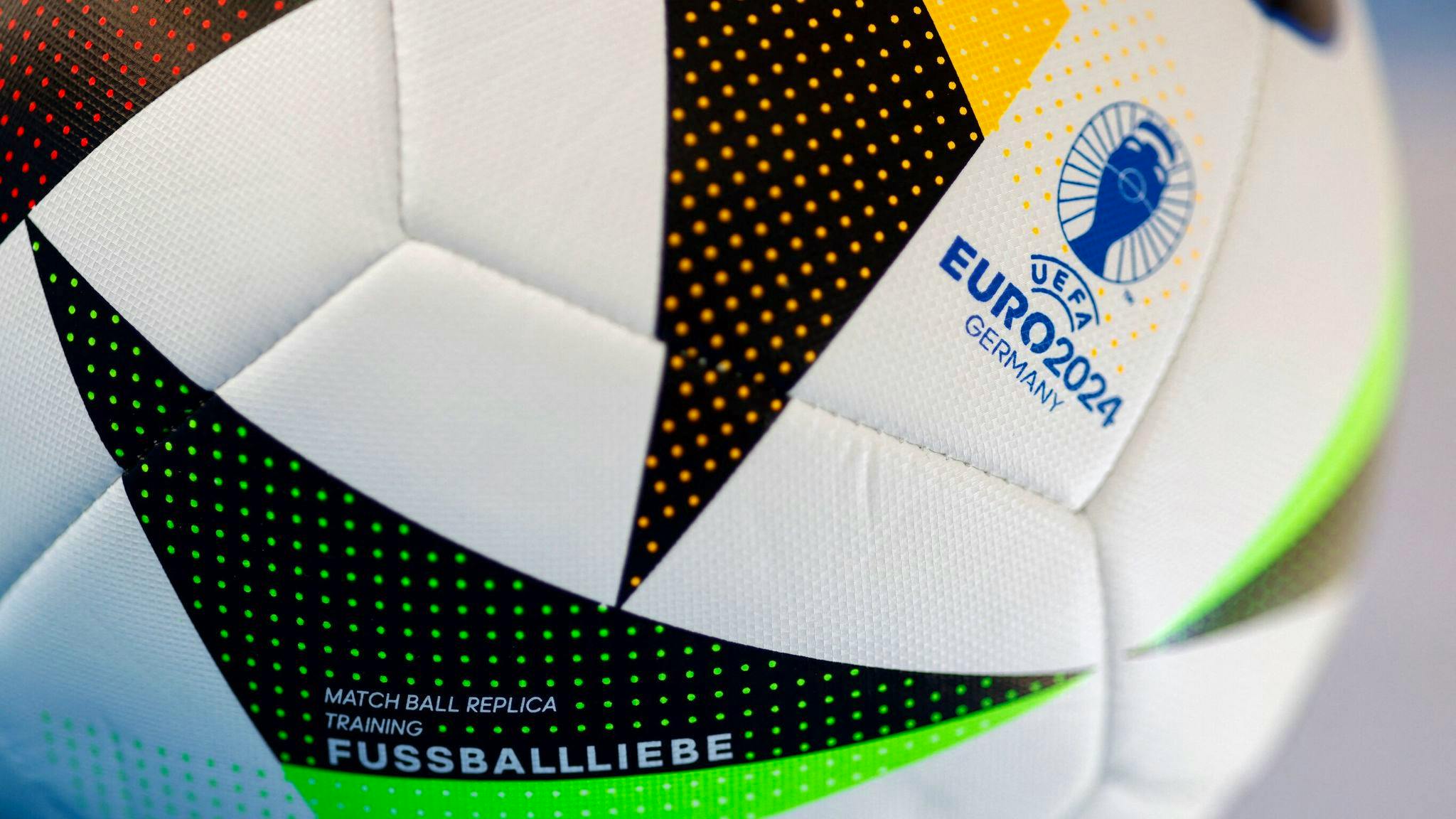How to watch Euro 2024 | Dates, groups, fixtures & more info
Potentially the closest contest in years.

Football is already back in our lives as the latest edition of the UEFA European Championship gets underway this week!
With what is sure to be the greatest edition of the competition for the longest time, we’re bringing all that you’ll want and need to know ahead of kickoff, including how to watch Euro 2024, fixtures, dates and lots more.
How to watch Euro 2024
All 51 games of Euro 2024 will be shown live on Freeview channels BBC and ITV.
BBC and ITV have shared the broadcasting rights for major international football tournaments for some time now, with the pair agreeing beforehand on who gets what games.
In terms of England’s matches, BBC will show their first two group stage matches while ITV will have the potentially crucial third.
Should they make it through to the knockout stage, ITV will then have their Round of 16 matchup and their Semi-final fixture if they make it that far. BBC will have the Quarter-final match, again if they were to make it that far.
As for the final, both channels will share it with their own individual coverage.
BBC & ITV broadcast teams
BBC and ITV each have their own Euro 2024 broadcast team, comprised of old football stars and some legends plus the usual suspect presenters and pundits.
BBC
BBC have some great former England stars part of their team this year along with some Premier League managers.
- Presentesr: Gary Lineker, Gabby Logan, Mark Chapman, Alex Scott
- Pundits: Waye Rooney, Micah Richards, Rio Ferdinand, David Moyes, Cesc Fabregas, Ashley Williams, Frank Lampard, Joe Hart, Ellen White, Rachel Corsie, Thomas Frank
- Commentators: Guy Mowbray, Jonathan Pearce, Steve Bower, Steve Wilson, Vicki Sparks, Robyn Cowen
- Co-commentators: Alan Shearer, Jermaine Jenas, Danny Murphy, Martin Keown, James McFadden
ITV
Similar to BBC, a mix of legends, stars and managers make up ITV’s team, with the most notable sure to be Ro Keane, who will no doubt be coming with some more iconic lines throughout the tournament.
- Presenters: Mark Pougatch, Laura Woods
- Pundits: Ian Wright, Roy Keane, Gary Neville, Ange Postecoglou, Karen Carney, Eni Aluko, Graeme Souness, Danny Rohl, Christina Unkel
- Commentators: Clive Tyldesley, Joe Speight, Sam Matterface, Seb Hutchinson, Pien Meulensteen
- Co-commentators: Lee Dixon, Ally McCoist, Andros Townsend
When does Euro 2024 start?
Euro 2024 kicks off on Friday 14th June, with the first match due to start at 8pm BST.
Euro 2024 dates
Euro 2024 will start on Friday 14th June and will run for a full month, finishing on Sunday 14th July.
The group stage gets things started, with each team playing three games in this stage.
The group stage will end on 26th June, with the qualified teams going through to the first knockout stage, the Round of 16, which starts on 29th June.
When is the Euro 2024 final?
The Euro 2024 final takes place on Sunday 14th July.
Where is Euro 2024?
Euro 2024 will take place in Germany.
The hosts have previously hosted the competition once before in 1988 (hosted as West Germany), but they did also host a few games during the multi-national Euro 2020 tournament, which saw games played all over Europe.
Euro 2024 venues
There are 10 venues in total from around Germany which will host the tournament. They are:
- Olympiastadion Berlin, Berlin – 70,033
- Fussball Arena Munchen, Munich – 66,026
- BVB Stadion Dortmund, Dortmund – 61,524
- Stuttgart Arena, Stuttgart – 50,998
- Volksparkstadion, Hamburg – 50,215
- Arena AufSchalke, Gelsenkirchen – 49,471
- Frankfurt Arena, Frankfurt – 48,057
- Cologne Stadium, Cologne – 46,922
- Leipzig Stadium, Leipzig – 46,635
- Dusseldorf Arena, Dusseldorf – 46,264
Who has qualified for Euro 2024?
24 teams have qualified for Euro 2024, with only one side making their debut in the competition.
There are a few top nations with big-name players who have missed out, but none more major than Norway, which includes Erling Haaland and Martin Odegaard.
As for those who did qualify, here is the 24-team field that makes up this year's contest:
- Germany (H)
- England
- France
- Spain
- Italy
- Belgium
- Netherlands
- Croatia
- Portugal
- Hungary
- Scotland
- Switzerland
- Denmark
- Austria
- Poland
- Ukraine
- Turkey
- Czech Republic
- Slovakia
- Slovenia
- Serbia
- Albania
- Romania
- Georgia (D)
Key: H = Host, D = Debutant
Euro 2024 groups
The 24 teams that will compete in Euro 2024 are divided up into six groups of four teams. The groups are:
Group A
- Germany
- Scotland
- Hungary
- Switzerland
Group B
- Spain
- Croatia
- Italy
- Albania
Group C
- Slovenia
- Denmark
- Serbia
- England
Group D
- Poland
- Netherlands
- Austria
- France
Group E
- Belgium
- Slovakia
- Romania
- Ukraine
Group F
- Turkey
- Georgia
- Portugal
- Czech Republic
Euro 2024 format
Euro 2024 begins with the group stage, where each team will play the other three teams in their group.
Teams will get three points for a win, one point for a draw and no points for a loss. Goal difference can play a key factor in the groups as if two teams finish in level points, the team with a superior goal difference will finish ahead.
The top two teams from each group will go through automatically, meaning 12 spots are filled for the Round of 16.
The remaining four spots are for the four best third-placed teams in the groups. These four will be determined by results and goal difference.
Once the 16 teams have been figured out, the tournament will head for the knockout stage.
The knockout stage, or simply knockouts, consists of the Round of 16, Quarter-finals, Semi-finals, and then the Final.
Each game in the knockouts is single elimination, with draws at the end of 90 minutes being decided by extra time, then penalties if there is still no winner after 120 minutes.
Euro 2024 fixtures & schedule
| Date | Time (BST) | Teams | Venue |
Group Stage | |||
| Friday 14th June | 8pm | Germany vs Scotland | Fussball Arena Munchen |
| Saturday 15th June | 2pm | Hungary vs Switzerland | Cologne Stadium |
| Saturday 15th June | 5pm | Spain vs Croatia | Olympiastadion |
| Saturday 15th June | 8pm | Italy vs Albania | BVB Stadion Dortmund |
| Sunday 16th June | 2pm | Poland vs Netherlands | Volksparkstadion |
| Sunday 16th June | 5pm | Slovenia vs Denmark | Stuttgart Arena |
| Sunday 16th June | 8pm | Serbia vs England | Arena AufSchalke |
| Monday 17th June | 2pm | Romania vs Ukraine | Fussball Arena Munchen |
| Monday 17th June | 5pm | Belgium vs Slovakia | Frankfurt Arena |
| Monday 17th June | 8pm | Austria vs France | Dusseldorf Arena |
| Tuesday 18th June | 5pm | Turkey vs Georgia | BVB Stadion Dortmund |
| Tuesday 18th June | 8pm | Portugal vs Czech Republic | Leipzig Stadium |
| Wednesday 19th June | 2pm | Croatia vs Albania | Volksparkstadion |
| Wednesday 19th June | 5pm | Germany vs Hungary | Stuttgart Arena |
| Wednesday 19th June | 8pm | Scotland vs Switzerland | Cologne Stadium |
| Thursday 20th June | 2pm | Slovenia vs Serbia | Fussball Arena Munchen |
| Thursday 20th June | 5pm | Denmark vs England | Frankfurt Arena |
| Thursday 20th June | 8pm | Spain vs Italy | Arena AufSchalke |
| Friday 21st June | 2pm | Slovakia vs Ukraine | Dusseldorf Arena |
| Friday 21st June | 5pm | Poland vs Austria | Olympiastadion |
| Friday 21st June | 8pm | Netherlands vs France | Leipzig Stadium |
| Saturday 22nd June | 2pm | Georgia vs Czech Republic | Volksparkstadion |
| Saturday 22nd June | 5pm | Turkey vs Portugal | BVB Stadion Dortmund |
| Saturday 22nd June | 8pm | Belgium vs Romania | Cologne Stadium |
| Sunday 23rd June | 8pm | Switzerland vs Germany | Frankfurt Arena |
| Sunday 23rd June | 8pm | Scotland vs Hungary | Stuttgart Arena |
| Monday 24th June | 8pm | Croatia vs Italy | Leipzig Stadium |
| Monday 24th June | 8pm | Albania vs Spain | Dusseldorf Arena |
| Tuesday 25th June | 5pm | Netherlands vs Austria | Olympiastadion |
| Tuesday 25th June | 5pm | France vs Poland | BVB Stadion Dortmund |
| Tuesday 25th June | 8pm | England vs Slovenia | Cologne Stadium |
| Tuesday 25th June | 8pm | Denmark vs Serbia | Fussball Arena Munchen |
| Wednesday 26th June | 5pm | Slovakia vs Romania | Frankfurt Arena |
| Wednesday 26th June | 5pm | Ukraine vs Belgium | Stuttgart Arena |
| Wednesday 26th June | 8pm | Czech Republic vs Turkey | Volksparkstadion |
| Wednesday 26th June | 8pm | Georgia vs Portugal | Arena AufSchalke |
Round of 16 | |||
| Saturday 29th June | 5pm | TBD | BVB Stadion Dortmund |
| Saturday 29th June | 8pm | TBD | Olympiastadion |
| Sunday 30th June | 5pm | TBD | Cologne Stadium |
| Sunday 30th June | 8pm | TBD | Arena AufSchalke |
| Monday 1st July | 5pm | TBD | Frankfurt Arena |
| Monday 1st July | 8pm | TBD | Dusseldorf Arena |
| Tuesday 2nd July | 5pm | TBD | Fussball Arena Munchen |
| Tuesday 2nd July | 8pm | TBD | Leipzig Stadium |
Quarter-finals | |||
| Friday 5th July | 5pm | TBD | Stuttgart Arena |
| Friday 5th July | 8pm | TBD | Volksparkstadion |
| Saturday 6th July | 5pm | TBD | Olympiastadion |
| Saturday 6th July | 8pm | TBD | Dusseldorf Arena |
Semi-finals | |||
| Tuesday 9th July | 8pm | TBD | Fussball Arena Munchen |
| Wednesday 10th July | 8pm | TBD | BVB Stadion Dortmund |
Final | |||
| Sunday 14th July | 8pm | TBD | Olympiastadion |
Euros history
The European Championship started back in 1960 and has been held every four years since then, with the exception of 2020 which was postponed a year due to COVID-19 (it was and still is known as Euro 2020).
The tournament is the second most-watched football competition, only being beaten unsurprisingly by the World Cup.
Originally, the competition was named the European Nations’ Cup, but that name held only for two tournaments before being changed in 1968. Ever since the 1996 edition, it has been shortened to the UEFA Euro [year], or more commonly simply just the Euros.
During the first five editions, only four teams would compete in the final tournament, although more did compete in the qualifying rounds. It expanded to eight teams in 1980, then again to 16 in 1996, and then finally expanded to the 24 sides that we know it now in 2016.
All teams other than the host nation must qualify for the tournament via the qualifying process, which typically begins just over a year before the tournament starts.
Up until 2016, the winner of the Euros were invited but not obliged to compete in the FIFA Confederations Cup the following year. This contest was competed by the winners of each of the six continental championships (UEFA, CONCACAF, CONMEBOL, AFC, OFC and CAF), plus the current FIFA World Cup champions and the host nation.
But since the 2020 edition onwards, the winner of the Euros now competes in the mandatory CONMEBOL - UEFA Cup of Champions.
Euros winners
There have been a total of 10 winners of the Euros throughout history, with some surprise winners along the way.
The most notable wins of all time come from Denmark, who won in 1992 despite not even qualifying properly for the competition, and Greece, who surprised the hosts Portugal in the final by beating them 1-0.
Spain and Germany hold the distinction of having the joint-most Euros titles with three each (Germany won two as West Germany). Spain are also the only team to have defended their title, having won in 2008 and defending it in 2012.
Here is the full list of European Championship winners:
1960 – Soviet Union
1964 – Spain
1968 – Italy
1972 – West Germany
1976 – Czechoslovakia
1980 – West Germany
1984 – France
1988 – Netherlands
1992 – Denmark
1996 – Germany
2000 – France
2004 – Greece
2008 – Spain
2012 – Spain
2016 – Portugal
2020 – Italy
Euros records
Team
Matches played: 53 – Germany/West Germany
Most championship wins: 3 – Germany/West Germany & Spain
Most wins (games): 27 – Germany/West Germany
Most losses: 17 – Denmark
Most goals scored (total): 78 – Germany/West Germany
Most goals scored (tournament): 14 – France (1984)
Most goals conceded (total): 55 – Germany/West Germany
Most goals conceded (tournament): 13 – Yugoslavia ()
Biggest margin of victory in a final: 4-0 – Spain vs Italy (2012)
Player
Most appearances (tournaments): 6 – Cristiano Ronaldo, Portugal (2004 - 2024)
Most appearances (games): 25 – Cristiano Ronaldo, Portugal
Most wins (games): 12 – Cristiano Ronaldo, Portugal
Most goals scored (total incl. qualifying): 55 – Cristiano Ronaldo, Portugal
Most goals scored (total excl. qualifying): 14 – Cristiano Ronaldo, Portugal
Most goals scored (tournament): 9 – Michel Platini, France (1984)
Youngest player: 17 years, 246 days – Kacper Kozlowski, Poland
Oldest player: 40 years, 86 days – Gabor Kiraly, Hungary
Fastest goal: 67 seconds – Dmitri Kirichenko, Russia (vs Greece, 2004)
Fastest goal in a final: 2 minutes – Luke Shake, England (2020)
Most clean sheets: 9 – Edwin van der Sar, Netherlands & Iker Casillas, Spain
Most clean sheets (tournament): 5 – Iker Casillas, Spain (2012) & Jordan Pickford, England (2020)
Manager
Most matches: 21 – Joachim Low, Germany
Most matches won: 12 – Joachim Low, Germany
Most tournaments: 4 – Joachim Low, Germany & Lars Lagerback, Sweden and Iceland
Single tournament
Most goals: 142 (2020)
Most goals per match: 4.75 (1976)
Most goals per match (since 1980): 2.78 (2020)
Fewest goals: 7 (1968)
Fewest goals (since 1980): 27 (1980)
Fewest goals per match: 1.4 (1968)
Fewest goals per match (since 1980): 1.93 (1980)

.png?auto=format&w=400)














